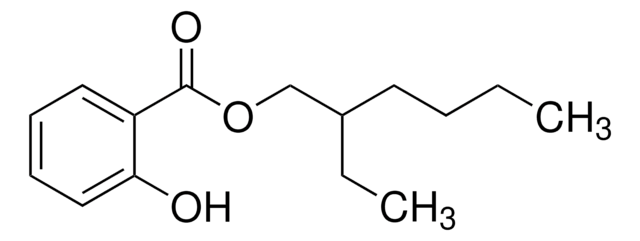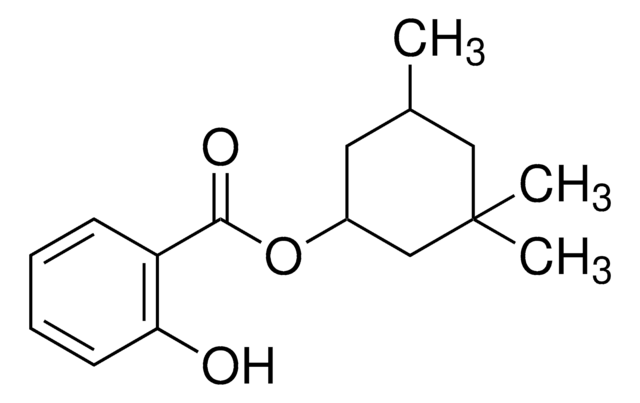1477943
USP
Octisalate
United States Pharmacopeia (USP) Reference Standard
Synonym(s):
2-Ethylhexyl salicylate, Octisalate, Octyl salicylate
About This Item
Recommended Products
grade
pharmaceutical primary standard
API family
octisalate
manufacturer/tradename
USP
refractive index
n20/D 1.502 (lit.)
bp
189-190 °C/21 mmHg (lit.)
density
1.014 g/mL at 25 °C (lit.)
application(s)
pharmaceutical (small molecule)
format
neat
SMILES string
CCCCC(CC)COC(=O)c1ccccc1O
InChI
1S/C15H22O3/c1-3-5-8-12(4-2)11-18-15(17)13-9-6-7-10-14(13)16/h6-7,9-10,12,16H,3-5,8,11H2,1-2H3
InChI key
FMRHJJZUHUTGKE-UHFFFAOYSA-N
Looking for similar products? Visit Product Comparison Guide
General description
Application
Analysis Note
Other Notes
related product
Signal Word
Warning
Hazard Statements
Precautionary Statements
Hazard Classifications
Aquatic Chronic 1
Storage Class Code
10 - Combustible liquids
WGK
WGK 2
Flash Point(F)
323.6 °F - closed cup
Flash Point(C)
162 °C - closed cup
Regulatory Listings
Regulatory Listings are mainly provided for chemical products. Only limited information can be provided here for non-chemical products. No entry means none of the components are listed. It is the user’s obligation to ensure the safe and legal use of the product.
FSL
Group 4: Flammable liquids
Type 3 petroleums
Hazardous rank III
Water insoluble liquid
JAN Code
1477943-400MG:
Choose from one of the most recent versions:
Certificates of Analysis (COA)
Sorry, we don't have COAs for this product available online at this time.
If you need assistance, please contact Customer Support.
Already Own This Product?
Find documentation for the products that you have recently purchased in the Document Library.
Customers Also Viewed
Our team of scientists has experience in all areas of research including Life Science, Material Science, Chemical Synthesis, Chromatography, Analytical and many others.
Contact Technical Service





